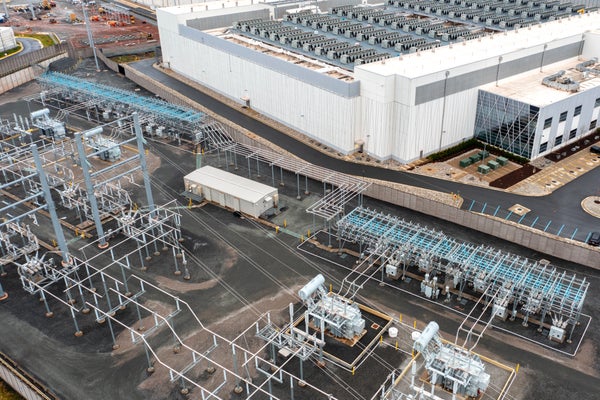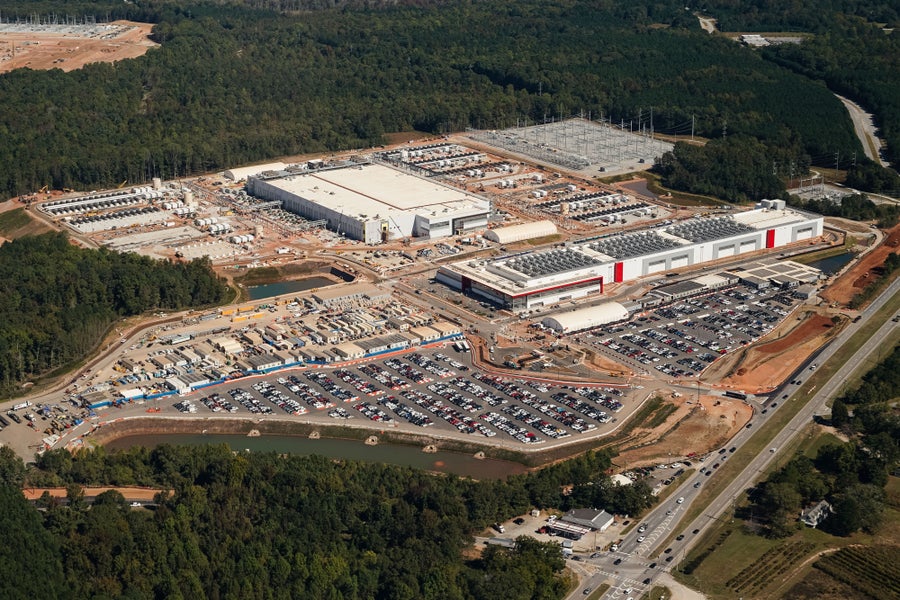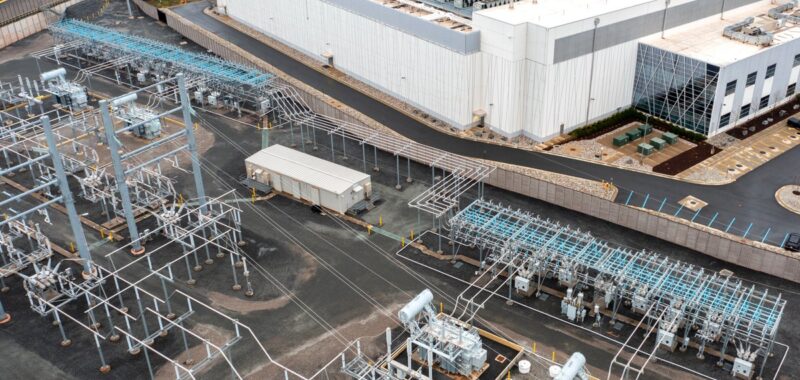January 22, 2025
3 min read
Here’s What’s in ‘Stargate,’ the $500-Billion Trump-Endorsed Plan to Power U.S. AI
Tech giants are backing a massive effort, announced by President Trump and dubbed the Stargate Project, to add data centers across the U.S.

A power substation near a the LC1 CloudHQ data center in Ashburn, Virginia, US, on Wednesday, March 27, 2024.
Nathan Howard/Bloomberg via Getty Images
CLIMATEWIRE | President Donald Trump announced an initiative Tuesday for several technology giants to invest at least $500 billion in artificial intelligence and data centers at U.S. locations over four years, a move that could shake up the electricity mix and heat up a technology race with China.
The Stargate Project is a new company with SoftBank, OpenAI, Oracle and MGX as lead investors. Microsoft and Nvidia are partnering in the project and construction at one site has started at a site in Texas, according to an Open AI press release. Approximately $100 billion is expected to be spent on Stargate “immediately,” the company said.
At the White House, Trump said he would help with Stargate’s developments “a lot” through emergency declarations.
On supporting science journalism
If you’re enjoying this article, consider supporting our award-winning journalism by subscribing. By purchasing a subscription you are helping to ensure the future of impactful stories about the discoveries and ideas shaping our world today.
“We have to get this stuff built .… They have to produce a lot of electricity, and we’ll make it possible for them to get that production done very easily,” Trump said.
“What we want to do is keep [AI infrastructure] in this country. China is a competitor,” added Trump, who appeared at the White House with Softbank’s CEO Masayoshi Son, OpenAI CEO Sam Altman and Oracle Chief Technology Officer Larry Ellison.
The announcement deepens the influence of large technology companies over the administration, which is working closely with Tesla CEO Elon Musk and has support from several other sector leaders. AI is a significant driver of the energy policy of Trump, who announced before his inauguration during a press conference that real estate developer Hussain Sajwani would invest $20 billion to build data centers in eight states. He and his Cabinet picks have pushed for an increase in drilling and energy production to meet surging demand for AI.
The growth in AI-driven data centers is expected to be a chief determinant of the makeup of the power grid — and its emissions — over the next two decades. A December report from Lawrence Berkeley National Laboratory concluded that electricity demand from data centers could triple by 2028. Many state officials — including from data center hub Virginia — have said they are uncertain how the grid will accommodate all the new power.

The QTS data center complex under development in Fayetteville, Georgia, US, on Thursday, Oct. 17, 2024.
Elijah Nouvelage/Bloomberg via Getty Images
In calling for an energy emergency on Monday, Trump cited an “inadequate and intermittent energy supply” and unreliable grid, saying they would worsen unless action is taken to power “the next generation of technology.”
At his confirmation hearing this month, Trump’s pick to lead the Interior Department, Doug Burgum, made a similar argument, saying that “clean coal” could help address inadequate electricity supplies to meet demand for AI.
“Particularly with this AI battle, people don’t understand what is coming,” said Burgum before the Senate Energy and Natural Resources Committee.
It was not immediately clear what power sources Stargate might tap for its data centers or if the total funding amount includes previous funding for data centers announced by the companies. Stargate officials said they were currently evaluating potential sites across the country.
Ellison said Stargate data centers already under construction in Abilene, Texas, currently involve 10 buildings that will expand to 20. Each building is a half million square feet, he said.
Mandy DeRoche, a deputy managing attorney at Earthjustice, urged the technology leaders in a statement to turn to low-carbon energy in supporting AI.
“The projected massive growth in demand for electricity from data centers has already raised electricity rates for households and small businesses in many parts of the country and threatens to increase pollution,” DeRoche said.
Technology giants like Microsoft have announced billion-dollar plans to build data centers around the country. In some cases, they’ve inked deals to power the facilities with nuclear and low-carbon energy.
On Monday, Trump rescinded a 2023 executive order from then-President Joe Biden on AI requiring developers that pose risks to national security, the economy or public health to share results from safety tests with the federal government. That order also had directed DOE and other agencies to develop guidelines for “safe” AI development.
Electricity demand from data centers also was a top topic of discussion between Biden and Trump officials, according to outgoing DOE Deputy Energy Secretary David Turk.
This story also appears in Energywire.
Reprinted from E&E News with permission from POLITICO, LLC. Copyright 2025. E&E News provides essential news for energy and environment professionals.

